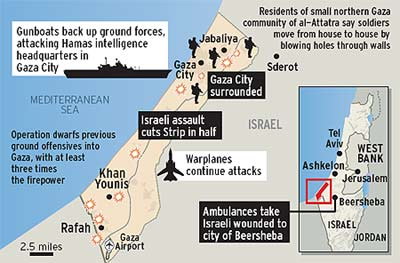JERUSALEM NEWS
NEWS AND INFORMATION
Events, happenings, and Opinions Concerning
Israel, Israelites, Judah, and Everyone Else
Jerusalem News-832
Jerusalem News-832
9 Tevet 5769, 5 January 2009
Contents:
1. Slain
Hamas
Policemen Were Terrorists
2. Israelis Attack on the Ground
3. Gaza rockets put Israel's nuclear plant in battle zone
4. Chana
Sorum:
Arabs in Florida Threaten Jews with Holocaust
5. The Disengagement Was a Mistake
6. Daniel Pipes: Have Israelis Finally Learned the Strategic Value of Territory?
7. Psalm Read Aloud on Army Radio
1. Slain
Hamas
Policemen Were Terrorists
Website Identified With Hamas: Policemen Killed In Gaza Were 'Izz Al-Din
Al-Qassam Members
www.thememriblog.org/blog_personal/en/12573.htm
Rashid Thabet, who writes regularly for a website identified with Hamas, has
praised the policemen killed in Gaza, stating that they were no mere regular
cops who flunked out of school and were recruited to oppress the residents
on behalf of a tyrannical regime, but policemen who were the elite of
Palestinian society.
He said that nearly all of them were 'Izz Al-Din Al-Qassam members, who by
day carried out security missions and by night engaged in jihad and attacks.
Source: Palestine-info.info, December 29, 2008
Map Taken from "The Scotsman"

|
2. Israelis Attack on the Ground
Gaza in flames as Israelis launch ground offensive
http://www.scotsman.com/latestnews/Gaza-in-flames-as-Israelis.4841672.jp
Published Date: 04 January 2009
By David Leask
Extracts:
ISRAEL invaded Gaza last night in a dramatic escalation of the
bloody week-long war that has already cost more than 400 lives.
Ignoring international calls for restraint, tanks and troops, backed by
helicopter gunships, entered the Palestinian territory under the cover of
darkness amid reports of fierce resistance.
Explosions and flames lit up the night as ground forces moved in on four fronts
in the north, south and centre of the Gaza Strip.
Under bright white light from parachute flares, weapons-laden troops, poured
through the perimeter fence around the Strip while attack helicopters flew
overhead. The sound of gunbattles could be clearly heard.
Prior to the assault, Israel had turned off the power in the attack zones,
plunging them into darkness to reduce the effectiveness of the Palestinian
militants manning defences.
Reports from Israel last night suggested at least 30 Hamas fighters had been
killed in opening clashes. Hamas, however, almost immediately claimed to have
killed an unspecified number of Israeli solders.
Earlier, Israeli jets and artillery had pounded the defensive positions of Hamas,
the radical group which controls the territory, killing at least 11 people in an
attack on a mosque.
The Israel Defence Forces (IDF) had also concentrated an intense attack with
missiles and shells from tanks, cannons, aircraft and warships shortly before
dusk, the end of the Jewish Sabbath, on the no-man's-land between Gaza City
proper and the Israeli frontier, which was designed to destroy mines, roadside
bombs and booby traps set by Hamas before troops moved in.
Israel's prime minister, Ehud Olmert, had earlier ordered the mobilisation of
"tens of thousands" of reservists in a signal that the country is bracing itself
for a major military operation. After the ground offensive began, defence
minister Ehud Barak said: "The campaign won't be easy and it won't be short. We
do not seek war but we will not abandon our citizens to the ongoing Hamas
(missile] attacks."
Officials at the IDF last night said their objective was to take control of
areas in Gaza used by Hamas to launch rockets at Jewish settlements.
Senior Israeli figures made it clear the invasion was not a minor operation.
Brigadier Avi Benayahu, said: "This won't be a school outing. We are talking
about many long days."
Defiant officials from Hamas made it clear they were up for a fight. The group,
in one message, said Gaza would turn into a "graveyard for Israeli solders". In
another, broadcast immediately after the invasion, it told the Israelis: "Gaza
will not be paved with flowers for you, it will be paved with fire and hell."
The group's leader, Khaled Mashaal, exiled in Damascus, Syria, had earlier told
Al-Jazeera TV: "To Israeli soldiers I say: a black fate awaits you if you invade
Gaza. We're sure of our victory, as we've prepared a better battle, and as Allah
is on our side."
The IDF stressed it was playing tough too. A spokesman warned any Gazan found
hiding "terrorists" or weapons would be treated as a terrorist.
The intensification of fighting came after US President George Bush refused to
condemn Israel's actions in Gaza and in spite of a day of action that saw tens
of thousands across the world protest against the war.
Israeli jets have carried out wave after wave of air strikes on Gaza over the
past week. Yesterday, the Palestinian authorities said at least another 11
people had died in an explosion at a mosque in the Gazan town of Beit Lahiya.
Four children were said to be among the dead.
The mosque blast brought the total Palestinian death toll to at least 446. A
quarter of the dead are said to be civilians.
Israeli jets yesterday also killed a Hamas leader, targeted the group's central
intelligence HQ and attacked Gaza's American International School.
Israel said it was determined to stop the rockets fired by Hamas from Gaza into
towns and cities in its south.
Israeli officials, meanwhile, said the number of missiles fired by Hamas had
fallen in recent days, from 100 a day last week to about 60 yesterday. Two
Israeli civilians were hurt last night after rockets struck a house, a cafe and
a playground in Ashdod.
3. Gaza rockets put Israel's nuclear
plant in battle zone
From: imra@netvision.net.il
Israeli officials say that Hamas has also acquired dozens of Iranian-made
Fajr-3 missiles with an even longer range. Many fear that as the group
acquires ever more sophisticated weaponry it is only a matter of time before
the nuclear installation at Dimona, 20 miles east of Beersheba, falls within
its sights. Dimona houses Israel's only nuclear reactor and is believed to
be where nuclear warheads are stored.
Gaza rockets put Israel's nuclear plant in battle zone
Growing concern over Hamas's new arsenal
The Times (UK) January 2, 2009
www.timesonline.co.uk/tol/news/world/
middle_east/article5430133.ece
There were growing fears in Israel last night that Hamas missiles could
threaten its top-secret nuclear facility at Dimona.
Rocket attacks from Gaza have forced Israelis to flee in ever greater
numbers and military chiefs have been shaken by the size and sophistication
of the militant group's arsenal.
In Beersheba, until a few days ago a sleepy desert town in southern Israel,
there is little sign of the 186,000 inhabitants. Schools are closed and the
streets of shuttered shops echo with the howl of sirens warning of incoming
rockets.
Israeli planes, meanwhile, began a new stage yesterday in their offensive on
Gaza, killing Nizar Rayyan, a senior Hamas official. The one-tonne bomb in
Jabaliya is also understood to have killed two of his four wives and four of
his twelve children. More than 400 Palestinians have been killed in the six
days of Israeli attacks.
Despite a diplomatic mission by Tzipi Livni, the Israeli Foreign Minister,
to Paris, the Israeli army continued to muster thousands of troops and
scores of tanks along Gaza's border for a possible ground offensive. Israel's
airstrikes are designed to blunt Hamas's capacity to fire its new Grad
missiles deep into its territory.
The weapons are smuggled in through tunnels and by sea, replacing homemade
Qassam rockets.
Israeli officials say that Hamas has also acquired dozens of Iranian-made
Fajr-3 missiles with an even longer range. Many fear that as the group
acquires ever more sophisticated weaponry it is only a matter of time before
the nuclear installation at Dimona, 20 miles east of Beersheba, falls within
its sights. Dimona houses Israel's only nuclear reactor and is believed to
be where nuclear warheads are stored.
"Maybe Hamas will get a big present from Iran or Hezbollah, a few good
long-range missiles and they'll use it," said Limor Brina, 40, a jeweller
who is learning the lessons of life under rocket threat: she sleeps with her
clothes on and heads to a shelter whenever the siren sounds.
Israel's worst nightmare is that soon all its cities will be within range
either of the Hezbollah Katyushas arrayed on the Lebanese border to the
north or the increasingly sophisticated missiles stockpiled by Hamas to the
south. Both groups have links to Israel's archenemy Iran.
Israel has said that its aim is to smash Hamas's rocket-firing capability
but also to topple the hardline Islamist regime that seized power in the
Gaza Strip in 2007 after bloody street battles with its secular rivals Fatah.
Until that goal
is achieved, many in Beersheba are packing their bags and heading for Tel
Aviv or Eilat.
"Maybe 30 or 40 per cent of people have left the city," said Ron Shukron,
26, running one of the few grocery shops still open. As he spoke a siren
echoed through the empty streets. With only 15 seconds to take cover, he
stepped under a reinforced support beam in the ceiling. Seconds later came
the dull thud of a rocket
exploding on the edge of town.
--------------------------------------------
IMRA - Independent Media Review and Analysis
Website: www.imra.org.il
4.
Chana
Sorum:
Arabs in Florida Threaten Jews with Holocaust
Shalom,
Video of Pro Hamas attacking Pro-Israel in US and when you watch video notice
that Pro- Israel people carry Israel and America flags and Pro- Palestinians
carry no American flags but yet they live here.
http://www.youtube.com/watch?v=j3Xl68kP4wo
Ps. Warning a Arab lady screams very bad words about Israel and the people that
support them.
Blessings,
Chana
5. The Disengagement Was a Mistake
"We said missiles would haunt Ashkelon and they said we were delusional.
We
lost our homes and our lives for nothing, for nothing at all in exchange.
And in the end, we're returning to fight there."
'We lost our homes for nothing,' says reservist from former Gaza settlement
By Nir Hasson Haaretz Last update - 05:25 05/01/2009
www.haaretz.com/hasen/spages/1052596.html
Three years after being evacuated from settlements in the Gaza Strip, some
of the evacuees are now returning - in uniform.
Aharon Cruz, a paratroops officer, lived in Netzarim for two years before
the disengagement. On Sunday, he and his unit, to which he had been recalled
a mere day after his wedding last Thursday, were back at the settlement's
ruins in central Gaza.
"On one hand, there's a feeling of 'what did we leave for?'" said his
father, Rabbi Ze'ev Cruz. "On the other hand, there's joy that he is
returning to a place he knows."
The ground operation has aroused strong feelings among the evacuees. Some
see it as a first step toward returning to their former homes. But most
simply want to shout "we told you so!" And the feelings are intensified
among those who have sons serving in Gaza.
"It's a very difficult feeling," said Ami Shaked, former chief security
officer of the Gush Katif settlement bloc, whose son is a paratrooper. "This
is the first war in which my son is defending me instead of me, him."
But beyond that, "everything we said then has come true. What is happening
today reopens the wounds. The thought arises that perhaps we shouldn't have
given in; perhaps we should have been more insistent, ratcheted up the
struggle another notch. But that's history."
Yossi Neuman, a reserve officer in Southern Command who once lived in Neve
Dekalim, was called up over a week ago. His son Itai, a tank commander,
called him yesterday from the ruins of Netzarim.
"It's a destructive feeling," Neuman said. "I'm here on an emergency call-up
and my son is fighting for what we once had. We said missiles would haunt
Ashkelon and they said we were delusional. We lost our homes and our lives
for nothing, for nothing at all in exchange. And in the end, we're returning
to fight there."
For many evacuees, the feelings were heightened by the news that the son of
Zvika Bar-Hai - a West Bank settler who was one of the leaders of the fight
against disengagement - was seriously wounded on the first day of the ground
operation.
But the army's return to Netzarim was particularly emotional for former
residents of that settlement. "I got text messages that said 'stop
everything, we'll soon be back,'" said one, Itzik Vazana. "We're hoping for
the day when we return. I think we've come a long way from the expulsion
until today. We've made a big circle, and in the end, we're returning to
Netzarim. Tomorrow morning we won't return to the settlement, but it's a
process that will ripen slowly."
"It's a stab in the heart," added another, Eliyahu Ozen. "Today it is clear
that when I lived in Netzarim, I was the country's flak jacket. Today, I
live with the feeling that I did my job. Too bad they didn't want it any
more."
6. Daniel Pipes: Have Israelis Finally
Learned the Strategic Value of Territory?
http://www.danielpipes.org/blog/2008/12/have-israelis-finally-learned-the-strategic.html
The land for peace concept is in jeopardy, write Aron Heller and Matti Friedman
for the Associated Press:
Israeli hard-liners have warned for many years that any territory Israel vacates
will be used to attack it. Now they can point to the Hamas missile that slammed
into a bus stop in this port city Monday, killing a 39-year-old woman. It was
fired from the Gaza Strip, which Israel gave up in 2005 and is now ruled by
Hamas militants who reject the existence of the Jewish state. ? Israelis who
never thought they would be living under rocket fire prepared bomb shelters.
Newspapers and TV stations displayed color-coded maps informing Israelis that
they had 15, 30 or 45 seconds to reach cover after a warning siren goes off. In
Ashdod malls, directions to the nearest shelters were posted.
It's called learning the hard way. After all, the same lesson was evident in
2006, when Hizbullah took advantage of the IDF's 2000 retreat from its Lebanese
cordon sanitaire to snuggle right up to the border and shoot off missiles. As
the Hamas rockets improve, an ever-larger portion of Israel's population comes
under fire, now estimated between 700,000 and a million persons, with the number
steadily growing. It's only a matter of time until the rockets reach Tel Aviv,
the country's largest city, and Dimona, the site of its nuclear plant.
Israeli intelligence apparently estimates that Hizbullah now possesses rockets
with a range that can reach Tel Aviv and beyond, targeting the vast majority of
Israelis. As Yaakov Amidror, a former general, puts it, "The historical lesson
of Oslo, of Lebanon and of Gaza proves that with every concession, every
territory we leave is used for attacks against us." One wonders whether this
lesson will be remembered when negotiations over the West Bank and the Golan
Heights start up again. (December 31, 2008)
7. Psalm Read Aloud on Army Radio
http://www.israelnationalnews.com/News/News.aspx/129210
by Hillel Fendel
Extracts:
(IsraelNN.com) In an unprecedented radio event, a chapter of
Tehillim (Psalms) was read aloud during prime-time on IDF Army Radio, on behalf
of the war effort.
The broadcasters were Kobi Arieli and Avri Gilad, who represent the
religious-nationalist and left-secular viewpoints, respectively, on the
humourous/political "The Last Word" show.
Arieli then dedicated the next moments to the soldiers in Gaza, and recited:
"May the L-rd hear thee in the day of trouble, may the Name of the G-d of Jacob
strengthen thee out of Zion... Some trust in chariots, and some in horses - but
we will call out in the Name of G-d. They fall, but we are arisen and stand
upright. Save L-rd, O King, Who hears on the day that we call."
To See Previous Issues
Jerusalem News Archives
Join the Brit-Am Ephraimite Discussion Group
Just Send an
e-mail
with "Subscribe" in the Subject Line
and in the Message
Main Page
Your Offerings and Orders for our Publications



